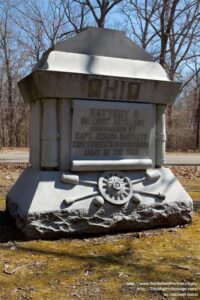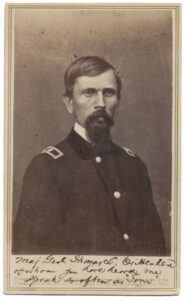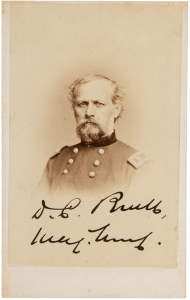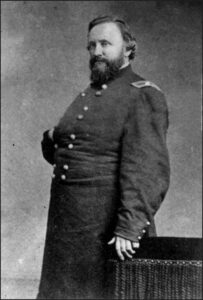Captain Joseph Barlett’s Inglorious Fate after Shiloh
In studying any battle in detail, one finds promising officers who were cut short by the grim reaper of battle—men who died or were maimed just as they gained a name for themselves. Not to say that name would have persisted. Alfred Iverson excelled leading the 20th North Carolina at Gaines’ Mill, and William Terrill was widely praised for his command of a battery at Shiloh. Both men had controversial careers after their initial taste of recognition and glory.

Shiloh, due to its scale and ferocity, cut down many officers. Among those was Capt. Joseph Bartlett, commander of Battery G, 1st Ohio Light Artillery. He volunteered upon hearing of Fort Sumter and attained a good reputation that ballooned at Shiloh. He was not killed or wounded at Shiloh, and yet his name disappeared after the battle. Reading James Barnett’s “History of Company G, Ohio Light Artillery” (held by Western Reserve Historical Society) was particularly enlightening on what Bartlett and his battery did at Shiloh and Bartlett’s sad fate after his apogee on April 7.
Don Carlos Buell’s Army of the Ohio made a forced march to reach Savannah, Tennessee and left behind wagons and most of the artillery. Infantry were prioritized, and only regular artillery batteries were earmarked to cross the Tennessee River to aid Ulysses S. Grant. Bartlett asked Thomas L. Crittenden, his division commander, to come along. Crittenden was impressed with his moxie and agreed.
Battery G only had eighty-five men, as many were left at Savannah in care of the baggage; the battery needed to travel light. It took all night to get the cannon up the steep bluff of Pittsburg Landing, which was clogged with stragglers and cowards from the Army of West Tennessee (renamed Army of the Tennessee right after Shiloh). Like many batteries at Shiloh, Bartlett’s gunners had an assortment of cannon with four 6-pounder smoothbores and two 12-pounder Wiard rifles. The latter were rare. Their carriage allowed the guns to be elevated, allowing them to be used as mortars, although they rarely did such service.

Battery G mostly fought at Duncan Field. Bartlett divided his unit into three two cannon sections to cover the large field and ensure the brigades led by Lovell Rousseau, Jeremiah Tilford Boyle, and William Sooy Smith each had support. Bartlett had to divide his command since the Confederates had four batteries opposing the Federals at Duncan Field and Buell only had two other batteries, both engaged to the east at Sarah Bell Field. Grant could not throw forward all his batteries due to ammunition shortages and losses from April 6. Also, the Rebels came hard at Crittenden, and support was needed right away. James B. Fry yelled to one section of Battery G, “for God’s sake turn them in quick; no matter about the position just get to work: it will be hot here!” Despite facing more cannon, Bartlett’s sections held their own, and the Rebels were driven away completely from Duncan Field by 1:00 p.m. after three hours of fighting. Battery G only suffered three wounded men, with two back in action by April 13.
Bartlett received direct praise from Buell, Crittenden, and Terrill, who upon meeting him asked “Will you take my hand? I am glad to meet and to know you.” Buell told him “in my own name and in the name of this army and of your country I wish to thank you and your gallant battery for this day’s work. When you stopped their advance on your left with your last rounds we went in and drove them back and the victory was won.” Buell then saluted Bartlett. Crittenden’s report was glowing with praise: “To this officer and his battery my whole division gives praise” and “Bartlett attracted my attention by his bravery and conduct.”

Bartlett’s career unraveled the next day. After Shiloh illness ran rampant in the Federal army. Much of it was due to the water being contaminated by the dead. In the April 17 issue of the Cleveland Plain Dealer, Pvt. William Duncan of the 1st Ohio wrote, “We lay on our arms all night with the dead lying around us. The stench was horrible, and we had to drink ditch water in which we could literally taste the dead matter.” As late as April 13 Bartlett noted “the smell of the dead is horrid today. There is no telling how many were killed. Have been, burying all the week, and not done yet.”
The day after Shiloh, Bartlett was attacked with inflammation of the stomach and never recovered. The likely reason is that his battery rested on the night of April 7 near polluted water. Bartlett and Boyle later found the spring was clogged with dead Rebels. One was a young man seemingly still alive, but part of his skull was taken off, and some of his brains could be seen in the severed half of his skull, like a saucer holding slop. His eyes moved, but he could not speak. He was guarded until he died twelve hours later.

Battery G would see hard service, but without Bartlett to lead them. At Stones River in the “Slaughter Pen” broken Wiard cannon can be seen today, a testimony to their service. Bartlett resigned in January 1863, a victim not of shot and shell, but of an ailment contracted in the aftermath of victory. He was laid low by drinking the wrong water. As for Battery G, they fought in many other battles after 1862, including Chickamauga, Franklin, and Nashville.
Other Union battery commanders at Shiloh would go to have long and distinguished careers such as John Mendenhall, Andrew Hickenlooper, Ezra Taylor, Allen C. Waterhouse, and John Wesley Powell. Terrill saw promotion to brigade command for his efforts, which was arguably a waste of his talent (a similar fate befell Francis Shoup in the Confederate army). Bartlett died in 1916, leaving no account of his service beyond his official report and an account in the April 22 issue of the Cleveland Morning Leader Cleveland Morning Leader. His grave in Toledo, Ohio is simple, but Battery G is on the marker where his body rests. He seemingly remains known only to the serious student of Shiloh.
